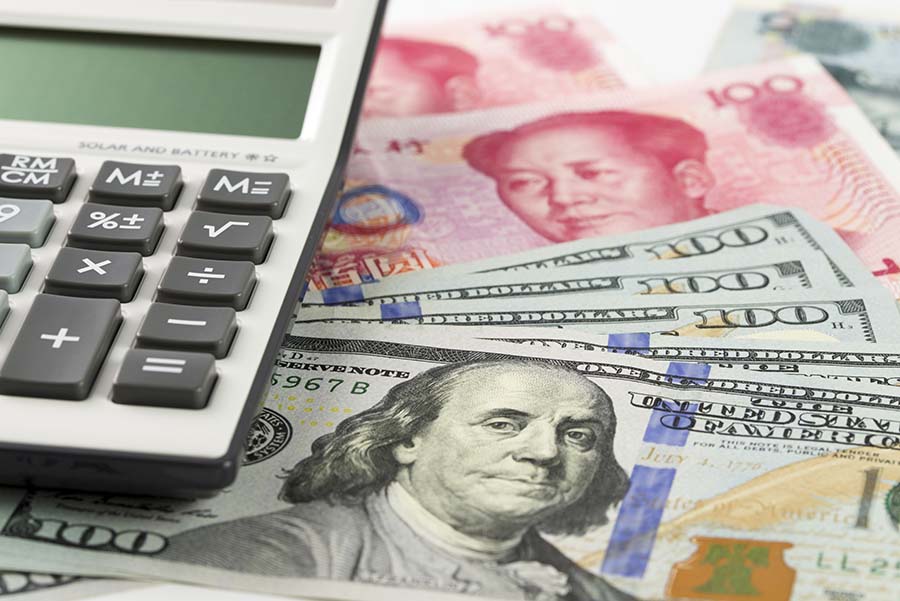
The United States and China are waging a trade war of words, where phrases like “coerced technology transfer” and “25 percent tariff” are tossed around but nothing actually happens. The American list of demands presented in Beijing last week was impressively long, but the list of actions the U.S. has yet been willing to take is extremely short.
One of the empty phrases on the Chinese side is “currency devaluation.” Beijing won’t devalue the yuan against the dollar, for reasons which may surprise both policymakers and mainstream economists.
Most pointedly, the last time Beijing devalued, Chinese exports did not soar. Instead, money fled the country. In 2015, the People’s Bank of China talked vaguely of a new exchange rate regime and tacked on a small devaluation against the dollar. Money was leaving China on a net basis at the time. The pace of capital exit then roughly doubled, because holders of yuan believed it would become less valuable.
Remarkably, the People’s Bank shot itself in the same foot in early 2016. Capital exit was slower this second round but the cumulative effect was enough to trigger global concern about a balance of payments crisis. Lesson finally learned, Beijing in late 2016 imposed new restrictions on money leaving the country and reversed the yuan’s slide against the dollar with a 7 percent rise in 2017.
The result was that foreign exchange reserves stabilized. A devaluation risks money leaving again, directly contrary to China’s policy goals. What policymakers often fail to understand is Chinese currency policy is not a reflection of strength but weakness. What mainstream economists often fail to understand is China’s exchange rate isn’t meant to adjust to change, for example to new U.S. tariffs, it’s meant to enforce stability.
Capital exit is a chronic problem Beijing didn’t solve in late 2016. From infrastructure bonds to fight the Asian financial crisis to government funds directed to semiconductor firms today, China relies on savings by its people to fund state initiatives. Savings are trapped in low-interest accounts at state banks, long known as financial repression.
China claims to have a fast-growing economy, but the strain on its financial system is growing much faster. According to the Bank of International Settlements, from 2009 through 2016 credit extended to the non-financial sector rose at more than twice the pace of reported gross domestic product. The United States took 34 years to add to its debt burden what China did in eight years.
The starting point of Beijing’s financial policy is to ensure ordinary Chinese keep handing their money to domestic financial institutions, to keep the credit machine churning. Tools used are the restrictions on money leaving the country and an exchange rate which is set, first and foremost, to keep people from wanting to test those restrictions.
So the primary goal of Beijing’s exchange rate policy is not to boost exports, as U.S. critics believe. It’s not to adjust to domestic economic shifts, as basic economics indicates. It’s impossible to identify the yuan’s “true market value,” and hence its undervaluation or overvaluation. China has a non-market financial system that dictates the yuan’s level.
The International Monetary Fund treats the yuan as if it’s equivalent to the euro or the yen. This has no financial justification and is purely political. Meanwhile, those calling China a currency manipulator are correct, but not in the way they think. China manipulates the yuan by largely pinning it to the dollar. The exchange rate has stayed between six and seven yuan to one dollar for the last decade. Beijing does this mostly looking inward for the sake of stability, not outward for growth.
That last closes the circle on devaluation talk. A China devaluation threat stems from the idea it would cost American jobs. But such fear is misguided. In early 1994, China devalued the yuan a staggering 50 percent and the U.S. job market soared. From 2005 to 2008, the yuan rose 18 percent against the dollar and our job market weakened.
The main reason for this is China’s currency does not matter compared to our own policies. The second reason is the yuan doesn’t work the way normal currencies work. For both reasons, there won’t be a devaluation. There’s little reason to believe it would hurt the United States and plenty of reason to believe it will hurt China.
This article was originally published by The Hill.


